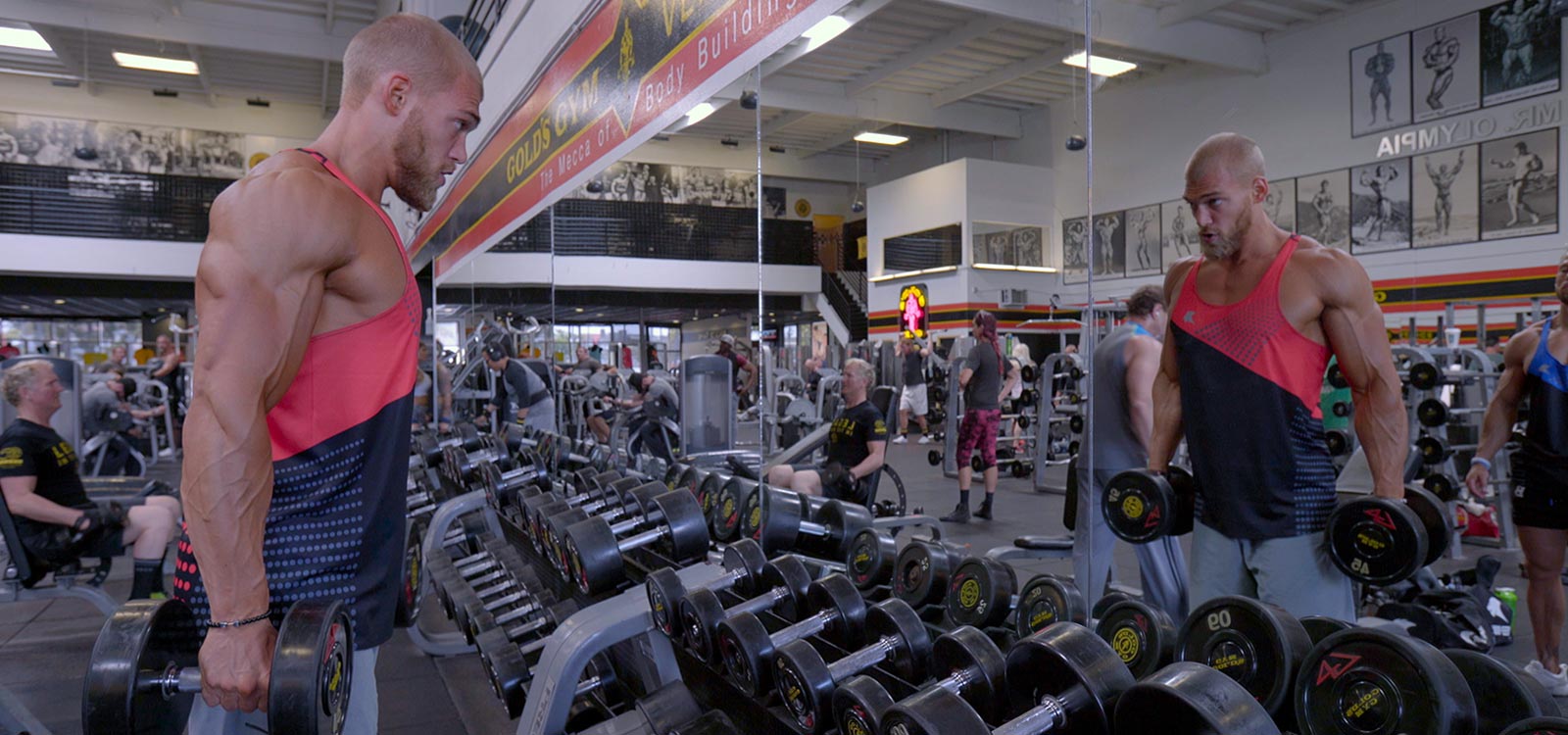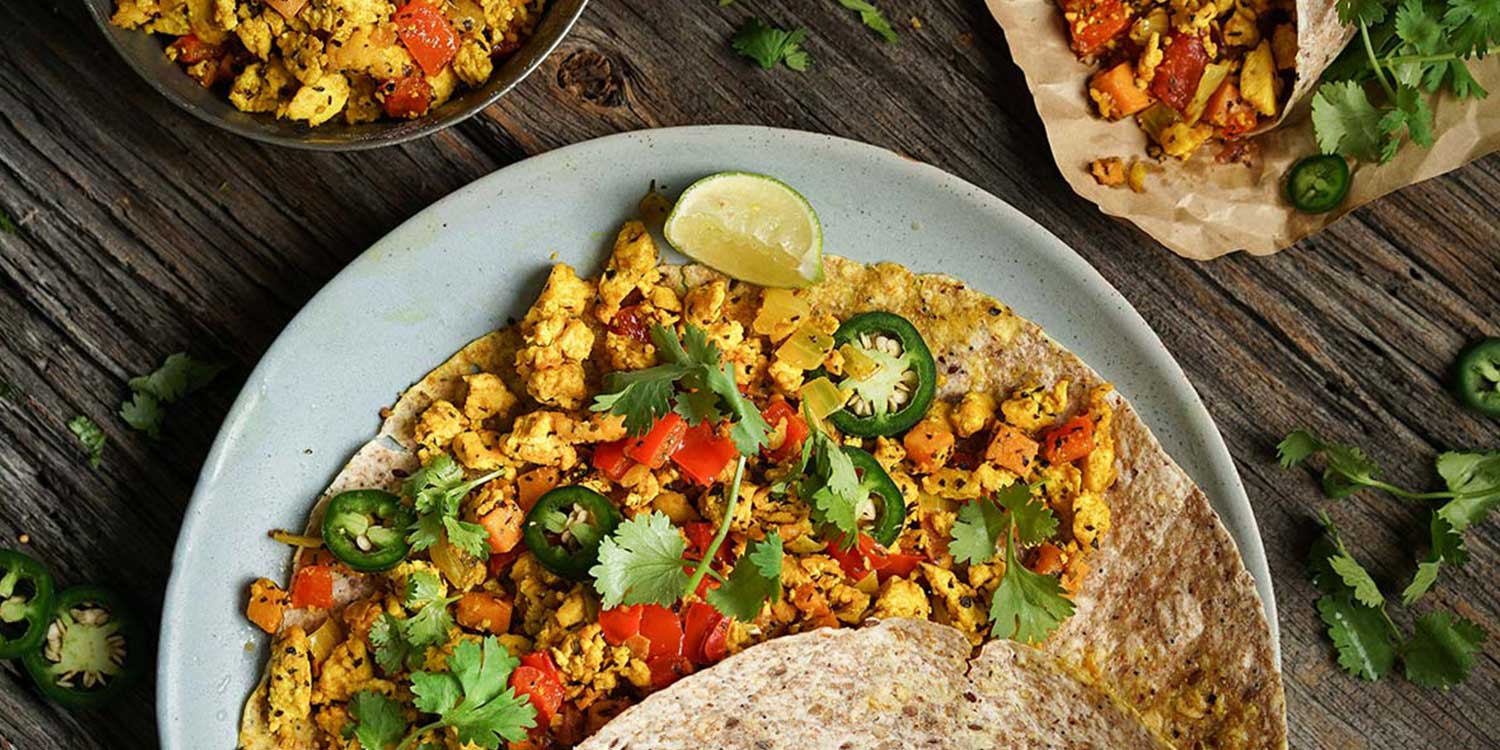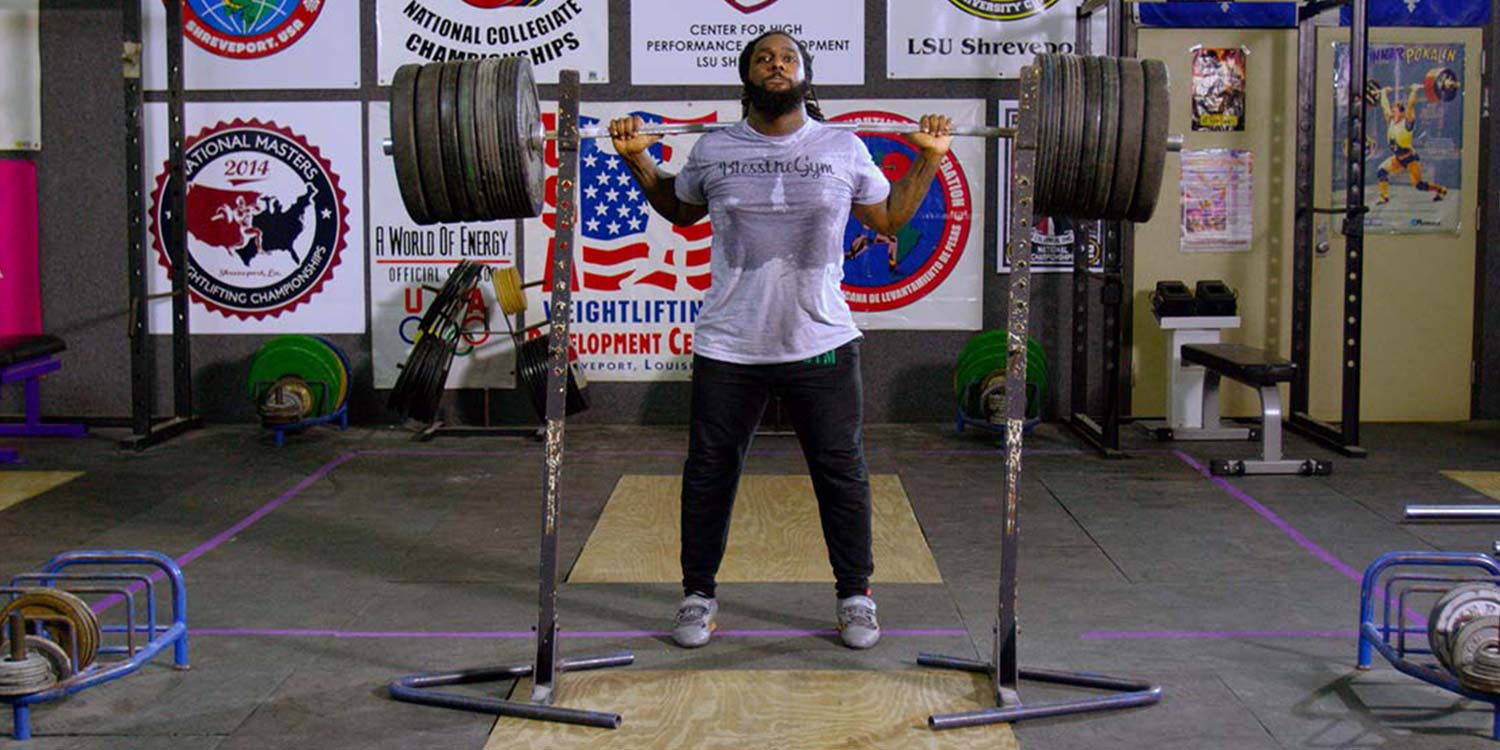

“You hit like a vegetarian.”
— Arnold Schwarzenegger in Escape Plan
The stereotype of the weak, skinny vegan has become so universal that most people would have a hard time believing any person of significant size or strength didn’t eat meat or other animal products. This is because we’ve been conditioned to believe that you need to eat lots of animal protein to build muscle and strength, and that protein really only comes from animal foods.
Of course only one of those two beliefs is actually true, as anyone who has ever seen a (herbivorous) silverback gorilla can easily deduce.
Most people, however, seem to think humans are more like lions, requiring meat or some form of animal protein at every meal to get big and strong. As discussed in What About Protein?, there are many reasons for how this myth became so ingrained in the popular culture, but the reality is that from the hippie culture of the 60s until fairly recently, a lot of those who followed a plant-based diet were pretty skinny. This is partly because, for several decades, most people who chose meat/animal-free diets did so solely for ethical, environmental or health reasons, and didn’t really care about having big muscles. And those who did care often lacked the basic nutritional understanding necessary to build muscle and strength eating plants.
As evidenced in The Game Changers, all of that has changed. The age of the weak, celery-munching vegan is over. Even Arnold Schwarzenegger — the godfather of muscle and strength — is now advising people to “just chill it with the meat”, acknowledging that there is no reason why eating a plant-based diet should pose any barriers to getting big and strong, and that doing so may even offer some significant advantages.
Caloric Surplus
Building muscle and strength is actually pretty simple from a physiological point of view: work out consistently and eat lots of food. If you train hard but don’t eat enough — or eat lots of food but don’t train enough — you probably won’t gain much muscle or get much stronger. This applies to everyone, whether you eat meat or not.
For novice lifters, eating “lots of food” means consuming 20-40% more calories than required for daily maintenance, and for more advanced lifters, 10-20% more (1).
One of the great things about plant-based food is that, by volume, it typically contains fewer calories than animal-based foods, allowing us to eat more total food and feel fuller, without necessarily gaining more body fat. You can find out more about that in Getting and Staying Lean.

For people whose top priority is to gain muscle and strength, people on a plant-based diet need to focus on plant-based foods that have higher caloric density than say, lettuce. Generally speaking, this means that making sure that meals and snacks include hefty amounts of grains, beans, tofu and tempeh, meat and dairy alternatives, nuts and nut butters, seeds, avocados, dried fruit, etc., in addition to fruits and vegetables. Those less concerned about eating mainly whole foods can also include plant-based meats, plant-based protein powders, plant-based protein/energy bars — whatever it takes to get hit the necessary caloric surplus.
Getting Enough Protein
The next basic step is to make sure you eat enough protein, because that’s what muscle is made out of, and you can’t build new muscle without it.
Because foods like meat, dairy and eggs usually contain a significant amount of protein — despite being deficient in other key nutrients like fiber, vitamin C, folate, and potassium — people on an animal-based diet who want to gain muscle and strength often just eat more of the foods they’re accustomed to, throwing in a protein shake or two for good measure.
For people starting in on plant-based eating things are a little different, in part because “protein” isn’t the first nutrient that comes to mind when they picture “vegetarian” or “vegan” food. More often than not they just think of salad, which for most people means lettuce, tomatoes, cucumber and maybe some shredded carrots — not exactly a high-protein dish.
Of course in most parts of the world, where meat isn’t a staple food, protein comes in the form of beans, peas, lentils, tofu, peanuts, other nuts and seeds, and so on. In so-called “developed” countries, however, with the exception of peanuts, very few people regularly consume any of the foods mentioned above, and think of plant-based foods as naturally low in protein. Hence the question people on a plant-based diet are constantly bombarded with: “Where do you get your protein?”
Fortunately, the plant kingdom is full of protein-rich foods, which means all that people who are looking to gain size and strength on a plant-based diet need to do is educate themselves on which foods those are and include lots of them in their daily eating schedule.

As we touch on in What About Protein?, the idea that you can’t get enough protein from plants, and/or that sources of plant protein are “inferior”, has no basis in science. What is backed up by scientific research is how much protein (animal or plant) is required to increase and/or maximize size and strength.
While the majority of people only need to eat about 0.8 grams of protein per kilogram of bodyweight (g/kg) per day — or 0.36 grams per pound (g/lb) — to maintain good health, research focused on gaining muscle and strength has consistently shown that considerably more protein is required (2).
Current research suggests that most athletes require between 1.2-2.0 g/kg (3), with endurance athletes on the lower end of the spectrum (4), and bodybuilders and strength athletes toward the upper end (≥1.6). If your goal is to increase muscle mass and strength as quickly as possible, like professional bodybuilders or powerlifters aim to do, research shows that as much as 2.2 g/kg can be effective (5).
It’s worth keeping in mind that people who consume this much protein, whether they eat animal products or not, commonly rely on protein powders or supplements in order to hit these higher target numbers (2). And ironically, since consuming protein at the top end of the spectrum often comes at the expense of other nutrients — including carbohydrates (6-9)— overfocusing on protein can actually undermine gains, as we’ll discuss below.
Since everyone’s bodies and goals are different, personal experimentation is often the only way to determine what works best for you.
Doing the Math
Since most people looking to gain more muscle and strength aren’t professional bodybuilders or powerlifters, we’ve chosen a range of 1.6-1.8 g/kg (0.73-0.82 g/lb) — considered more than sufficient for the majority of athletes (4)— to provide some sample calculations.
To figure out how much protein you need to eat per day to stay in this range, take your weight in kilograms and multiply by 1.6-1.8, or take your weight in pounds and multiply by 0.73-0.82. For example, if you weigh 77kg/170lbs, that equates to a range of 123-139 grams of protein per day.
If you eat five times per day (three meals plus one afternoon snack and one evening snack), divide this range by five and you now have the average amount of protein you need each time you eat. In this example, 123-139 grams divided by five is 25-28 grams. Of course you can always eat more protein at one meal or snack and less at another, since what matters most is your total daily intake (5,10).
In practical terms, plant-based meals/snacks that might fall into this range would include a couple of peanut butter sandwiches, a can of plant-based chili, a tofu-broccoli stir fry, spaghetti with plant-based meatballs, or a plant-based protein shake with banana and berries. Check out our recipes section for a wide array of protein-dense meals, smoothies, and snacks.
Protein Isn’t Everything
While getting enough calories and protein are key to gaining muscle and strength, carbohydrates also play a crucial role in achieving these goals, since they provide us with the fuel required to complete intense training sessions, while also supplying valuable fuel for the brain, helping us remain sharp and focused for workouts and competitions (3).
Research has shown that low-carbohydrate diets, including the popular high-fat, low-carb ketogenic diet, tend to undermine training goals and can slow or even block muscle and strength gains. A recent eight-week weight training trial where subjects were fed the same amount of total calories and protein showed that those eating a normal amount of carbohydrates gained 2.9 pounds of lean muscle mass, while those in the low-carb, ketogenic group gained none (11).
Even without going low-carb, sacrificing carbohydrates for protein can slow progress. A six-month study on rugby players — where calories and fat were matched between two groups — showed that those eating a more plant-based diet with ample carbohydrates gained five pounds of muscle while those eating an animal-based diet with more protein in place of carbohydrates gained only one (12).
The latest research suggests that in order to maximize gains, consuming carbohydrates in a range of 5-7g/kg — or 2.3-3.2 g/lb — is productive (13). To calculate how many carbohydrates you need per day to support size and strength gains, either take your weight in kilograms and multiply by 5-7, or take your weight in pounds and multiply by 2.3-3.2. For more about carbohydrates, including the role of unrefined carbohydrates like bananas, oats, and sweet potatoes can play in getting/staying lean, please refer to Getting and Staying Lean.
Further Advantages
Since plants are loaded with many other important nutrients — including fiber, healthy fats, vitamins, minerals, antioxidants and phytochemicals — a diet centered around them can also aid in building, maintaining, and protecting new tissues in other ways, as outlined in The Plant-Based Advantage.
Some of these advantages include:
A New Era
As exemplified by the bodybuilders and strength athletes featured in The Game Changers — including world-record holding strongman Patrik Baboumian, American record-holding Olympic weightlifter Kendrick Farris, and the defensive line of the Tennessee Titans — building and maintaining muscle and strength on a plant-based is not only possible, but quickly becoming the new normal across a broad range of sports.

As outdated myths about animal protein are put to rest — and the advantages of a plant-based diet are brought to light in the gym, on the field, and in the laboratory — the era of the skinny vegan, barely surviving on a diet of grass and twigs, is officially over.
Page References
(1) Aragon AA, Schoenfeld BJ. Magnitude and Composition of the Energy Surplus for Maximizing Muscle Hypertrophy: Implications for Bodybuilding and Physique Athletes. Strength Cond J. 2020 Feb.
(2) Morton RW, Murphy KT, McKellar SR, Schoenfeld BJ, Henselmans M, Helms E, Aragon AA, Devries MC, Banfield L, Krieger JW, Phillips SM. A systematic review, meta-analysis and meta-regression of the effect of protein supplementation on resistance training-induced gains in muscle mass and strength in healthy adults. Br J Sports Med. 2018 Mar;52(6):376-84.
(3) Thomas DT, Erdman KA, Burke LM. Position of the Academy of Nutrition and Dietetics, Dietitians of Canada, and the American College of Sports Medicine: Nutrition and athletic performance. J Acad Nutr Diet. 2016 Mar;116(3):501-28.
(4) Bagchi D, Nair S, Sen CK. Nutrition and Enhanced Sports Performance: Muscle Building, Endurance, and Strength. London: Academic Press; 2019.
(5) Stokes T, Hector AJ, Morton RW, McGlory C, Phillips SM. Recent perspectives regarding the role of dietary protein for the promotion of muscle hypertrophy with resistance exercise training. Nutrients. 2018 Feb;10(2). pii: E180.
(6) Nunes CL, Matias CN, Santos DA, Morgado JP, Monteiro CP, Sousa M, Minderico CS, Rocha PM, St-Onge MP, Sardinha LB, Silva AM. Characterization and comparison of nutritional intake between preparatory and competitive phase of highly trained athletes. Medicina (Kaunas). 2018 May;54(3).pii: E41.
(7) Kanter M. High-quality carbohydrates and physical performance: Expert panel report. Nutr Today. 2018 Jan;53(1):35-9.
(8) Clark M, Reed DB, Crouse SF, Armstrong RB. Pre- and post-season dietary intake, body composition, and performance indices of NCAA division I female soccer players. Int J Sport Nutr Exerc Metab. 2003 Sep;13(3):303-19.
(9) Jenner SL, Buckley GL, Belski R, Devlin BL, Forsyth AK. Dietary Intakes of Professional and Semi-Professional Team Sport Athletes Do Not Meet Sport Nutrition Recommendations — A Systematic Literature Review. Nutrients. 2019 May;11(5):1160.
(10) Reidy PT, Rasmussen BB. Role of ingested amino acids and protein in the promotion of resistance exercise-induced muscle protein anabolism. J Nutr. 2016 Feb;146(2):155-83.
(11) Vargas S, Romance R, Petro JL, Bonilla DA, Galancho I, Espinar S, Kreider RB, Benítez-Porres J. Efficacy of ketogenic diet on body composition during resistance training in trained men: a randomized controlled trial. J Int Soc Sports Nutr. 2018 Jul;15(1):31.
(12) Toro R, Mangas A, Quezada M, Rodriguez-Rosety M, Fournielles G, Rodriguez-Rosety I, Rodriguez Rosety MA, Alonso JA, Garcia-Cozar FJ, Duran Mdel C. Influencia de la dieta y el ejercicio en el perfil proteómico de una población deportista. Nutr Hosp. 2014 Nov;30(5):1110-7.
(13) Hoffman J. Dietary Supplementation in Sport and Exercise: Evidence, Safety and Ergogenic Benefits. Milton Park, Abingdon, Oxon: Routledge; 2019.
(14) Mosher SL, Sparks SA, Williams EL, Bentley DJ, Mc Naughton LR. Ingestion of a nitric oxide enhancing supplement improves resistance exercise performance. J Strength Cond Res. 2016 Dec;30(12):3520-4.